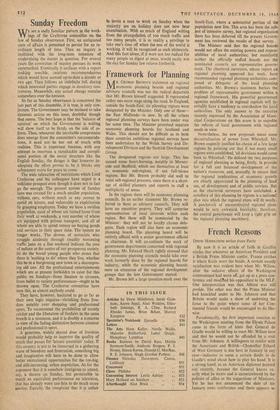. Sunday Freedom W E - see a sadly familiar pattern in the
work- . ings of the Crathorne committee on the law of Sunday observance. First, an antiquated
state of affairs is permitted to persist for an in- ordinate length of time. Then an inquiry is instituted with the long-term intention of mndernising the matter in question. For several years the 'committee of inquiry pursues its work unremarked. Eventually it surfaces with a report Makin'g sensible, cautious recommendations which would have seemed up-to-date a decade or two ago. Then follows an indefinite lull, during which interested parties engage in desultory con- troversy. Meanwhile, any actual change remains somewhere over the horizon.
So far as Sunday observance is concerned the last part of this timetable, it is true, is only con-
jecture. The Government may be inclined to take dynamic action on this issue, doubtful though that seems. The best hope is that the 'balance of opinion' on which the Government is waiting will show itself to be firmly on the side of re- form. Then, whenever the inevitable compromise does emerge from the committee's recommenda- tions, it need not be too out of touch with realities. This is important because, with any attempt to renovate a ramshackle and compli- cated portion . of the social structure like the English Sunday, the danger is that however .in- adequate the effort proves to be it blocks any subSequent move for years to come. The wide relaxation of restrictions which Lord Crathorne and his colleagues have urged is a wekome prospect even though it does not in fact go far enough. The present system of Sunday laws was created for a much smaller population, without cars, without much or any money to spend on leisure, and vulnerable to exploitation by grasping employers. Today we have a swollen population, most of whom are turned' loose from their work at weekends, a vast number of whom are 'equipped with private transport, and all of who'm are •able to spend money on buying goods and services in their spare time. The 'system no longer works. The droves of motorists who struggle aimlessly through steadily worsening traffic jams on a fine weekend indicate the core of tedium at the centre of our prosperous society. So do the bored young people who moan that there is 'nothing to do' where they live, whether this be in a burgeoning new town or a decompos- ing old one. All the professional entertainments which are at present forbidden to cater for this public on Sundays—from theatres to circuses, from ballet to variety performances—ought to be thrown open. The Crathorne committee have seen this, as almost anybody could.
They have, however, hesitated to go as far as their own logic requires—shrinking from free- dom notably over shopping and professional sport. To recommend the prohibition of county cricket and the liberation of funfairs in the same breath is a nonsense, and it is doubly a nonsense in view of the fading distinction between amateur and professional in sport.
A generous, widely shared dose of freedom would probably help to improve the quality of much that passes for 'leisure amenities' today. If this country is not to be immersed in a gathering wave of boredom and frustration, something big and imaginative will have to be done to allow better recreational opportunities for the too-big, and still-increasing, urban population. As for the argument that it is somehow irreligious to attend, say, a theatre on Sunday, but permissible to watch an equivalent performance on television, that has already worn too thin to do much more service. Equally, the complaint that it is unfair
to invite a man to work on Sunday when the majority are on holiday does not now bear examination. With so much of England wilting from the strangulation of too much traffic and too many people, it is in reality a privilege to take one's time off when the rest of the world is working. It will be recognised as such ultimately. And this fact alone, if it were not too radical for many people to digest at once, would easily win the day for Sunday law reform forthwith.




























 Previous page
Previous page